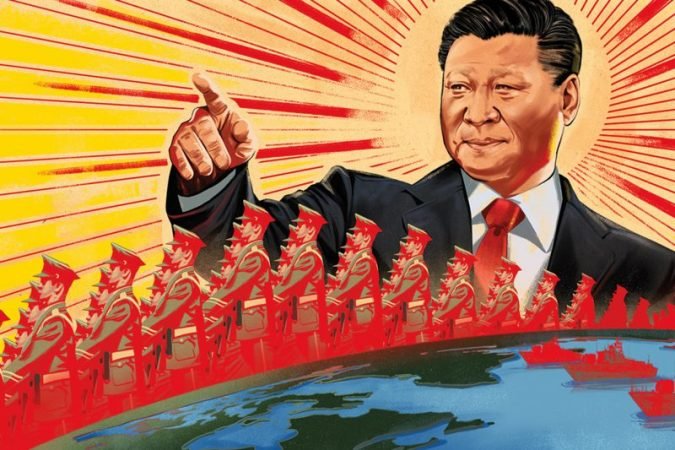The Chinese World Order: A contender & a disruptor

The Chinese world order presents us with some questions which will be very briefly touched upon here, as it may be a reality in the very foreseeable future with CVOID-19 pandemic acting as a catalyst in this regard. If China re-structures the system towards bi-polarity (as defined by neo-realists) or some sort of multi-polar system, where it is an Asian super-power and a prominent pole; in such a position it would be most likely that China would want to carve out a world-order which is less based on Western conceptions and significantly more on, an independent Chinese conception. There are two prognoses, one being from Kishore Mahbubani which states that the rise of China will change the world and bring in the Asian century, although this will benefit India too (his comments) and the other comes from offensive realist theorist John Mearsheimer that there is a certainty of a greater security conflict among China and USA. However, both of them coincide on a point that China is interested in changing the world order and is not a status-quoist power.
In the following paragraphs, we will try to understand what kind of world China aspires to create, and is the current-order worth maintaining.
Right of the bat, we can point out two things which can be considered to be the objectives for the Chinese conception of world order. Firstly, the centrality of China in the conceived world order as they consider they have the legitimacy to be so and as it was stripped off of this position by the western barbarians which it will reclaim. And secondly, the re-establishment of the tributary system (historically their original East Asian order) the mode of attaining this status which china considers to become a military and economic super-power.
The Chinese when they try to analyze how to reclaim the position of the Middle Kingdom, they take narratives from past and as we can see all their border claims are from the Qing, we can ascertain how seriously they take the past. The successive PRC leaderships have strategized from peaceful rise towards the current more assertive China and aspiring to be a global power and a regional hegemon.
As a regional hegemon in the near future, the Chinese would want to become the Middle Kingdom and create a regional structure based on the tributary system of Imperial China. This would entail it, creating a regional economic partnership under the shadow of obvious Chinese military hegemony which had existed before the 19th century in East Asia. However, as the world has become a smaller place because of globalization, we know that the ancient understanding of China as the Middle Kingdom will move beyond East Asia and encompass most of Asia, we can see glimpses of it from the Belt and Road initiative and its debt diplomacy.

The BRI and debt-diplomacy seem to be a way in which China is forcing nations into acknowledging the tributary status and act in accordance with the Chinese sovereigns under heaven and on earth. One may think how is China confident of achieving a situation where it will be able to create a world order around itself and encourage countries to move away from the Westphalia model of sovereign nation-states & Washington consensus in the economic realm. Let us look at some points which can bring more clarity on the subject.
If we take the Imperial Chinese conception of Center and Periphery, we can see that at the time of Han Dynasty they knew that centre can be stretched to a limited extent only and beyond that, it would be the existence of periphery. It was based on their past experience and they analyzed it would not be practically possible to secure the centre if it is stretched beyond capacities. During Tang dynasty we see, it creates a periphery where the Chinese were the overlords and under the tributary system, the periphery states maintained a cordial relationship.
Thus, securing the centre without stretching its financial capacities, by becoming the sovereign personality in the periphery, the Tang rulers tried to maintain the stability in those kingdoms so that the security of China is not under strain. It indirectly tried to provide legitimacy to the ruler as well as secured the Chinese boundaries resulting in the maintenance of peace & prosperity in the centre.
In the 21st century, post-opening-up the Chinese were able to achieve a level of growth which was unimaginable and with the growth of economic prosperity, a sentiment has developed, which I can at best articulate as an amalgamation of insecurities, examples being their handling of India-China border disputes, Xinjian, South China Sea, East China Sea, Hong-Kong as well as Taiwan and the increased confidence for reclaiming their lost glory. The Han-ization of Tibet, Xinjian, Manchuria & lower Mongolia can be seen as China expanding its centre and one can very easily asses, it will lead to redefining the periphery in the Chinese world-view.
The periphery is being redefined as immediate periphery (East, South and South-East Asia), which is why China is always acting out to remind India that it should accept China as the big brother and become part of the tributary system. Thus, when we view Chinese offer of mutual co-existence it comes with its own set of compromises which a post-colonial India would never accept. The second layer comprises of larger periphery which is the entire world and domination of which from Chinese perspective may take a long time, yet it will happen.
So, if we look at their trajectory, they want to evolve from a global power towards a regional hegemon and from there to the global hegemony, thus, becoming in true sense the Middle Kingdom. To achieve this, as early as possible (even symbolically), China understands the importance of UN, the creation of a system using the debt trap in Africa, Indo-pacific, Eastern Europe and elsewhere, it wants to utilize the Westphalian model (every nation-state is equal) devised by the western powers against them. The cultural inroads it is creating in Africa, its neighbourhood including Nepal may seem reminiscent of its civilizing of barbarians by imbibing in them the culture & language of Han people.
With the number of small states which China is able to dominate politically and economically, it will be able to dominate the policies and institutions in & under the UN. The Chinese worldview of creating the world order based on the centre, periphery and the tributary states can establish a mechanism in the short run within the current world-order where China is able to steer it towards the Chinese world order in the long run.
It is one of the many possibilities which may come true, but as the Middle Kingdom and centre of the world the Chinese may want the following:
In their immediate periphery, the Chinese would want Han-ization, it would happen in the areas and cultures it can successfully dominate and transform & the levels of Han-ization may vary from region to region. Other cultures and people who cannot be amalgamated into the Han civilizational definition will be allowed to exist but under the overlordship of the Chinese tributary state system.

The tributary states in a very later state may not be allowed to make significant bilateral agreements and may be advised to become a part of multilateral dialogues and organizations where they can, as a grouping under the Chinese may take those decisions with the Chinese sanctions. Although it may not happen in the same pattern, yet we cannot put the probability to be zero. A more accepting design which may have more acceptance in this globalized world may take place. Although Chinese may themselves will most certainly deal with countries mostly bilaterally from the position of the central power. China would, with every passing day increase its criticism for multilateral forums which it conceives to be created to contain it.
The maximum brunt of these Chinese ambitions would be faced by the immediate periphery and the Chinese plans would not go unchallenged, China would have to change its course from time to time and manoeuvre very artistically to achieve its goals and that too can happen only partially. One thing that comes out very loudly is that in the Chinese world order there may not exist the concept of sovereignty. And as we know that with sovereignty many allied features like rule of law, free speech (in particular criticism of CCP), democracy and all are lost.
Although it may sound impossible, the triumph of authoritarianism in international politics i.e, one should not underestimate the planning that the Chinese undertake. The Chinese are in for a long game and they will move towards these goals; however, realistically speaking it will not be possible to snatch away sovereignty from larger powers, yet we cannot be sure of anything when we are talking about 100 years or 200 years for that matter. And for the question, if the current world order is worth preserving, one would say without any shred of doubt, certainly YES!


















